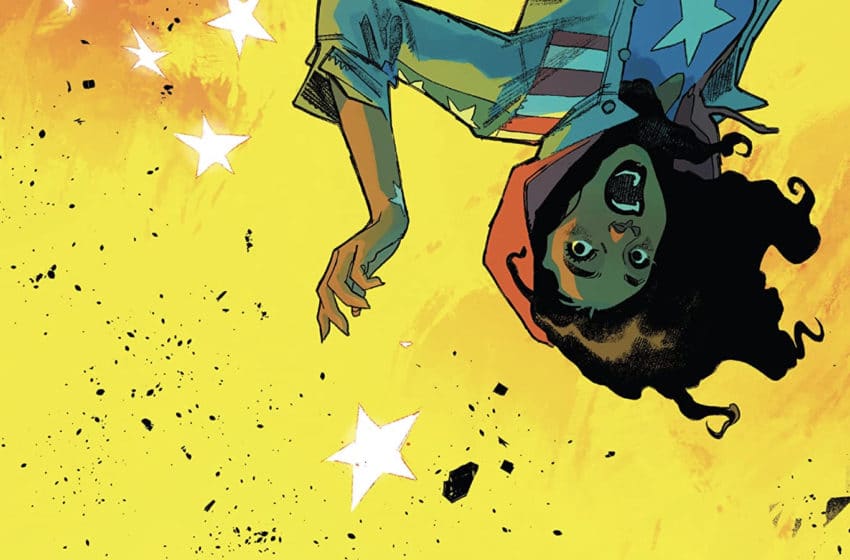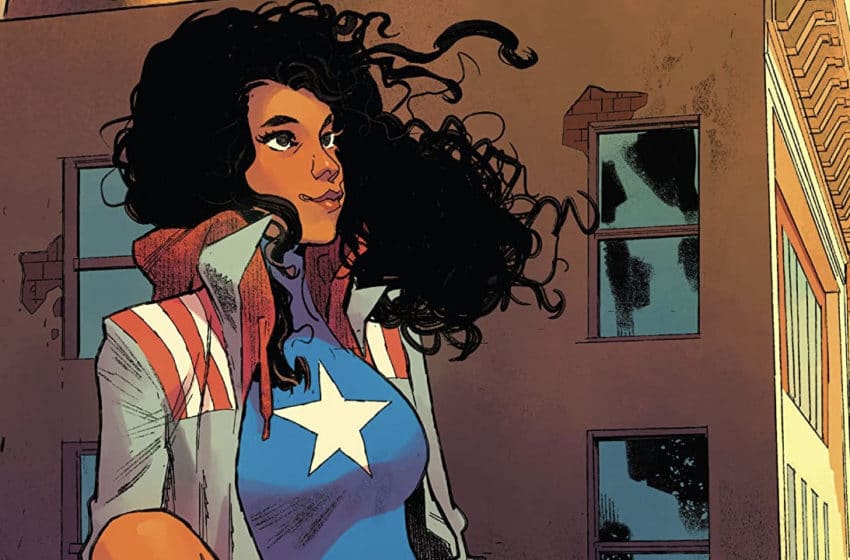Who favors yellow raincoats and long, tight braids, claims to be America’s long-lost sister, menaced America’s adoptive family, brought her to a mysterious tropical island run by scheming scientists, and introduced her to a massive retcon in which her powers emerged from their scheme? Catalina, that’s who. Her own scheme unfolds in America Chavez: Made in the USA #4, written by Kalinda Vazquez, art by Carlos Gomez, colors by Jesus Aburtov, letters by Travis Lanham.
In the backstory America Chavez had before America Chavez: Born in the USA began, our strong and confident gay heroine grew up in another dimension, the Utopian Parallel, then came to Earth after her moms died saving that dimension. (Sometimes she visits related dimensions: there’s a university in one of them.)
In the backstory she has now, she grew up on Earth, where she got sick young. Seeking a cure, her moms brought her to an island where unethical scientists experimented on young girls. Of course, the scientists wouldn’t let anyone leave: to rescue the kids, America’s moms sacrificed themselves. America, using her teleportation powers, escaped to the continental U.S., leaving her baby sister Catalina behind. Of course, America – young and traumatized – couldn’t remember these events.
At this point I’d prefer to forget them myself. Last issue ended with Catalina daring America to inject herself with “truth serum” and find out, well, the truth (though, again, that’s not how “truth serum” works). This issue begins with America and Catalina facing off, and doing a bit of pro forma fighting, in a lab full of tanks where young girls rest in what appears to be suspended animation, a trope last seen in… Joss Whedon’s TV show Dollhouse? Maybe that comparison is unfair.
But so is this issue: unfair to New Jersey, for one. When America can’t send her sister-nemesis to another dimension (because her dimensional-portal powers are fritzing), she sends Catalina instead to “one of the worst places on this world,” the Garden State Parkway-New Jersey Turnpike junction in Woodbridge, a genuinely pleasant suburban town.
The Garden State deserves better, and so do the basics of biomedicine. America injects herself with the “truth serum” Catalina left behind and– lo and behold– our heroine, without any further prompting, remembers everything. Catalina was telling the whole truth. She wants revenge against the girl who left her behind (as a toddler: Catalina remembers, though America forgot). America’s origins lie in earthbound trauma and in evil white people’s experiments. And now Catalina has a hostage: America’s adoptive brother. If America frees all the present-day girls from their lab tubes, what will Catalina do to him?
Carlos Gómez’s layouts are dynamic and varied, his children expressive and sympathetic if sometimes bug- (or anime-) eyed. Jesus Aburtov’s colors pop, as they should. Light-saturated, vertiginous, even dazzling, the moments when America uses her powers make up the best page spreads in the book, and they look wonderful – and empowering – on their own.
Marvel is, laudably, running a series about a Latina protagonist, with an all-Latina-except-one-bad-guy supporting cast, written and drawn by Latina and Latino creators. I am a very white girl. I may be missing a lot. America used to be Latina, and Puerto Rican, by adoption since she was born in another dimension. This series – unless they reverse the retcon – makes her Latina by birth: that change will matter to some readers (and some of those readers will be adoptees). There are parts of America’s story that I can’t fully understand. That’s true for America, the country, too.
And yet the book is what it is, and I am what I am, and right now they don’t match. This fine art team is doing all they can with a miniseries that’s not living up to its early promise, nor to the literally Utopian promise within this character as previously written. Kalinda Vazquez has written some terrific TV (including Star Trek: Discovery), but it’s hard to see how she can bring the fizz back to a plot as flat as this one, or to dialogue like America’s mother’s dying words: “When you think about your Mamá and I and this place…I hope you can just remember the good.” I hope so, too. But it’s a bit tough right now.
Stephanie Burt is Professor of English at Harvard. Her podcast about superhero role playing games is Team-Up Moves, with Fiona Hopkins; her latest book of poems is We Are Mermaids. Her nose still hurts from that thing with the gate.



